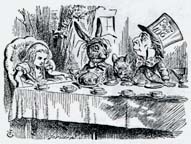After succumbing to her child-like naivety and following the white rabbit down the hole to Wonderland, Alice finds herself in a seemingly nonsensical world. Very different from that of her Victorian upbringing, this world contains talking creatures, magical snacks, and even live playing cards. Following her long fall that Alice believes will inevitably bring her "right through the center of the earth," (8) she shrinks herself with a bottle of potion in order to fit though a tiny door no more than a couple of inches high. However, because she has forgotten to fetch the key necessary to open the door, she sits down and cries in anguish. Later, falling into her own pool of tears, Alice thinks nothing more of it than "I wish I hadn't cried so much! I shall be punished for it now, I suppose, by being drowned in my own tears! That will be a queer thing, to be sure! However, everything is queer to-day" (18).

Alice clearly acknowledges the strange nature of Wonderland. Nonetheless, she tries to impose some kind of order on it by constantly reciting knowledge that she holds to be true, and upon meeting some of the creatures that live in Wonderland, Alice constantly attempts to correct their crude behavior. During her mad tea party with the Hatter, the March Hare and the Dormouse, she disagrees incessantly with her company over their table manners, or, in her eyes, the lack thereof.
"Have some wine," the March Hare said in an encouraging tone.
Alice looked all around the table, but there was nothing on it but tea. "I don't see any wine," she remarked.
"There isn't any," said the March Hare.
"Then it wasn't very civil of you to offer it," said Alice angrily.
"It wasn't very civil of you to sit down without being invited," said the March Hare.
"I didn't know it was your table," said Alice: "it's laid for a great many more than three."
"Your hair wants cutting," said the Hatter. He had been looking at Alice for some time with great curiosity, and this was his first speech.
"You should learn not to make personal remarks," Alice said with some severity: "it's very rude." (54-55)
Alice clearly hails from a middle class, if not higher, family in Victorian society. This much can be gleaned from her level of education, as well as from the leisure time that we observe her enjoying at the book's beginning. It can also be assumed, for this reason, that the morals of propriety and good manners so central to Victorian culture have been instilled in Alice to such a degree that although she knows that Wonderland and all of the creatures that reside in it are nonsensical and almost fantasy-like, she cannot help but to try to instill on them the same behavior that is expected of her. Alice epitomizes an adolescent, Victorian female, and the manner in which she conducts herself as perhaps the only civil character in Wonderland proves that she represents little more than a product of the society in which she was raised.
Questions
1. Tea parties and tea time were largely regarded by the ladies and gentlemen of Victorian society as a tradition central to the social culture of the era. What significance does including a "mad tea-party" have in Alice's Adventures in Wonderland? Why was Alice particularly perturbed by the conduct of the March Hare and the Hatter at the tea party?
2. Both Estella and Alice represent adolescent Victorian females. How does Alice's upbringing as a member of middle class Victorian society differ from Estella's upbringing as a member of a similar social class? We are not aware of the extent to which Estella has been educated in comparison to Alice, an obviously learned youth. Could this aspect of life account for any of the differences that persist between the characters of Alice and Estella?
3. Alice seems fairly mature for her age, scolding herself at times and often giving herself good advice. How has Alice's life thus far as a Victorian youth discouraged the growth of her imagination? Do you think this early maturation could have accounted for the fantasy-like nature of her dreams?
4. Despite the vast knowledge that Alice constantly tries to flaunt throughout the story, Carroll chooses not to employ sophisticated vocabulary in Alice's speech. How does this help Carroll control the pace at which we read the text?
5. Alice becomes offended when the March Hare calls her uncivil, yet she constantly takes it upon herself to point out the flaws in the behaviors of the creatures she meets. In addition, Alice herself has the bad habit of interrupting those who are speaking. Could this be a comment by Carroll on the nature of Victorian society? If so, what point does Carroll convey through scenes such as the "mad tea-party" quoted above?
Last modified 11 March 2009